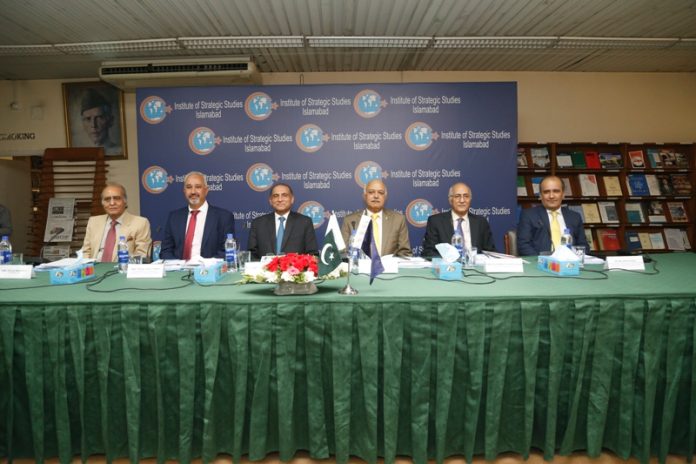Press Release
Seminar
“Hindu Nationalism and the Kashmir Dispute”
Oct 17, 2019
“India is an expansionist power which has designs not only for Pakistan but the entire South Asian region. The current Indian draconian actions have made Indian-Occupied Kashmir (IOK) the largest prison/ concentration camp for over 8 million people.” This was stated by Ambassador Faisal Niaz Tirmizi, Coordinator Kashmir Cell, Ministry of Foreign Affairs, during his address as Keynote Speaker at a seminar on “ Hindu Nationalism and the Kashmir Dispute” organized by the Institute of Strategic Studies Islamabad (ISSI) today. Ambassadors, members of the diplomatic corps, students and the media were present on the occasion.
Ambassador Tirmizi said that as policy makers, it is important to understand how the idea of Hindutva has gained traction in India. He went on to talk about the creation of the Kashmir cell in the Ministry of Foreign Affairs to facilitate an inter-ministerial process. Ambassador Tirmizi said he believed that “only a powerful idea can compete with a powerful idea.” Hence, in this regard he encouraged the public to give more suggestions on how to solve the Kashmir issue.
Other speakers at the seminar included: Dr. Mujeeb Afzal, Professor at the School of Politics and International Relations at Quaid-e-Azam University; Lt. Gen. Asif Yasin Malik (Retd.), Former Secretary Defence and Ambassador Muhammad Saeed Khalid. The working session was chaired by Ambassador Aizaz Ahmad Chaudhry, Director General ISSI.
While discussing Hindu nationalism and the myth of secular India, the speakers discussed how liberty, equality and neutrality is essential for any state to function. Contrary to this notion, by marginalising the minorities, through cultural support and with the backing of the political power, a Hindu Rashtra is being created in India. The future of the BJP was also discussed, during which, the fascist predispositions of the BJP leaders were highlighted. It was pointed out that BJP and RSS, through their hard-line policies have already laid the foundations for self-annihilation. On the question of how to deal with Hindu colonialism, particularly in the Kashmir context, the presenters said that if the people of India do not challenge the dehumanising aspects of their government, they will find themselves as part of a Hindu supremacist colonial democracy. All speakers agreed that Pakistan would not under any circumstances abandon Kashmir.
Earlier, in his welcome remarks, Ambassador Aizaz Chaudhry said that the abrogation of Articles 370 and 35-A by Prime Minister Modi is the fulfillment of a long ideological yearning, under the Hindutva ideology promoted by the RSS, to make a predominantly homogeneous Hindu nation to the detriment of Muslims and other minorities of India. The cruel lock-down has many facets including economic costs, demographic changes and psychological pressure. It has put India’s secular credentials in question. Even though there has been increased visible international condemnation of Indian atrocities, given the scale of the lock-down, the international reaction is far too little, he said.
Chairman BOG, ISSI, Ambassador Khalid Mahmood, in his concluding remarks pointed out that Hindu nationalism is multifaceted. In recent decades there has been a marked upsurge in Indian atrocities, it is particularly displayed in the Modi Government’s aggression to quell Kashmiris’ self-determination efforts. What is deeply troubling is how disenfranchisement of minorities in India is now institutionalised in India, he said.












